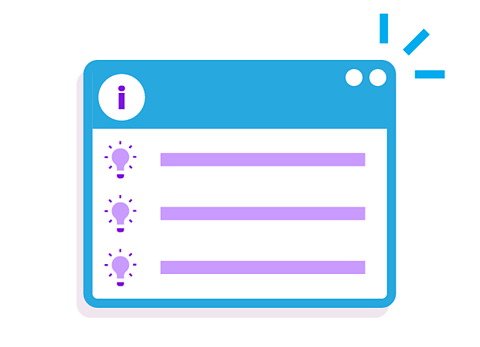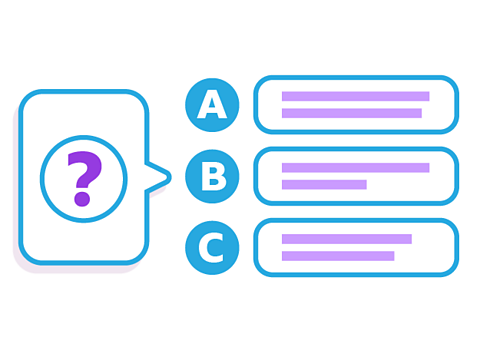Key points about indirect object pronouns in French

indirect object pronoun An indirect object pronoun replaces a noun that is the indirect object in a sentence, eg тI give an apple to the manт becomes тI give him an appleт. are used in place of the indirect object of a verb.
Indirect object pronouns in French use the same words as direct object pronouns, except for lui (him/her) and leur (them т Higher only).
Indirect object pronouns are used with verbs such as demander У (to ask), donner У (to give) and parler У (to speak to).
The position of indirect object pronouns is the same as direct object pronouns
Video: Indirect object pronouns in French
Watch the video to find out how to use indirect object pronouns in French.
Indirect object pronouns are used in place of the indirect object of a verb.
Indirect object pronouns
Or how to say less in French,
even when it gets a bit tricky.
Just like direct object pronouns, indirect object pronouns replace nouns to avoid repeating them two sentences in a row.
But the nouns they replace are preceded by the preposition У which means 'to'.
Take the question, "Is he giving the documents to Paul?"
In French that's:
Il donne les documents У Paul ?
You can answer:
Oui, il donne les documents У Paul.
Or to simplify if you've already just talked about Paul, place the indirect object pronoun before the verb.
Oui, il lui donne les documents.
But careful with nouns in the plural form.
They're replaced with 'leur'.
Il parle У ses collУЈgues
ЕўБ№ГІДЧГОБ№ВѕтІ
Il leur parle.
Tu poses des questions aux suspects ?
Oui, je leur pose des questions.
What are indirect object pronouns?
Indirect object pronouns replace nouns, to avoid repeating the noun two sentences in a row.
An indirect object pronoun is used in the place of the indirect object of a verb.
For example, in the sentence тI give the apple to the manт, the apple is the direct object of the verb, and the man is the indirect object.
French indirect object pronouns
The French indirect object pronouns are as follows:
| Sorry, something went wrongCheck your connection, refresh the page and try again./ ГОт (before a vowel or тhт) | (to) me |
| Sorry, something went wrongCheck your connection, refresh the page and try again./ Гйт (before a vowel or тhт) | (to) you |
| Sorry, something went wrongCheck your connection, refresh the page and try again. | (to) him / her / it (masculine and feminine nouns) |
| Sorry, something went wrongCheck your connection, refresh the page and try again. | (to) you |
For example, if you are giving an apple to a man and want to say тI give him an appleт, use lui to mean тhiГОт.
- Je lui donne une pomme. т I give him an apple.
When are indirect object pronouns used?
Indirect object pronouns are used with some verbs that are followed by У , including these:
| demander У т to ask (to) someone | je lui demande т I ask him/her |
| raconter/dire У т to tell/say to someone | elle te raconte/dit т she tells you |
| donner У т to give to someone | il me donne т he gives me |
| УЉcrire У т to write to someone | je lui УЉcris т I write to him/her |
| parler У т to speak/talk to someone | nous vous parlons т we talk to you |
| rУЉpondre У т to answer (to) someone | vous me rУЉpondez т you answer me |
| tУЉlУЉphoner У т to telephone (to) someone | ils nous tУЉlУЉphonent т they phone us |
Position of indirect object pronouns in different tenses
The rules for the position of indirect object pronouns are the same as for direct object pronouns.
Present and imperfect tenses
The indirect object pronoun comes between the subject and the verb:
For example:
- Il me donne une pomme. т He gives me an apple.
- Je lui tУЉlУЉphonais chaque soir. I used to phone him/her every evening.)
Immediate future ('aller' + infinitive) and modal verbs
In the immediate future (using aller + infinitive) or after a modal verb + infinitive, the indirect object pronoun comes just before the infinitive:
For example:
- Elle va te parler. - She is going to speak to you (singular).
- Vous devez lui rУЉpondre. т You need to answer him/her.
Perfect tense (passУЉ composУЉ)
When using the perfect tense, the indirect object pronoun goes before the auxiliary verb:
For example:
- Tu ГОтas УЉcrit une lettre ? т Did you write me a letter?
The perfect tense - Mini quiz

Fill in the blank with the correct indirect object pronoun.
Je _____ ai demandУЉ. т I asked him.
Je lui ai demandУЉ. т I asked him.
The correct indirect object pronoun to mean тhiГОт in this sentence is lui.
Position of indirect object pronouns in negative sentences
In negative sentences, the indirect object pronoun usually goes between the ne and the conjugated verb, or before the infinitive (in the immediate future and with modal verbs).
Negative sentences in the present and imperfect tenses
When using a negative sentence in the present tense, the indirect object pronoun comes after the ne:
For example:
- Il ne me donne pas de pommes. т He isnтt giving me any apples.
- Je ne lui tУЉlУЉphonais pas chaque soir. т I didnтt use to phone him/her every evening.
Negative sentences in the immediate future and with modal verbs
When using a negative sentence in the immediate future (using aller + infinitive) or after a modal verb + infinitive, the indirect object pronoun comes just before the infinitive:
For example:
- Elle ne va pas te parler. т She isnтt going to speak to you.
- Vous ne devez pas lui rУЉpondre. т You donтt need to answer him/her.
Negative sentences in the perfect tense (passУЉ composУЉ)
When using the perfect tense, the indirect object pronoun goes after the ne and before the auxiliary verb:
For example:
- Je ne lui ai pas demandУЉ. т I didnтt ask him.
Negative sentences in the perfect tense - Mini quiz

Put this sentence in the correct order:
Tu / une lettre / ГОтas / pas / ne / УЉcrit ? (Did you not write me a letter?)
Tu ne ГОтas pas УЉcrit une lettre ? т Did you not write me a letter?
Quiz - Indirect object pronouns in French
Practise what you've learned about indirect object pronouns with this quiz.
Higher Tier - Plural indirect object pronouns
The plural indirect object pronouns are as follows:
| Sorry, something went wrongCheck your connection, refresh the page and try again. | (to) us |
| Sorry, something went wrongCheck your connection, refresh the page and try again. | (to) you |
| Sorry, something went wrongCheck your connection, refresh the page and try again. | (to) them |
For example, if you are giving an apple to a group of people and want to say тI give them an appleт, use leur to mean тtheГОт.
- Je leur donne une pomme. т I give them an apple.

Remember
For the Higher Tier, you also need to know the verb offrir У , meaning тto offer (to)/to give (a present to)т.
For example:
Je leur offre un cadeau. - I give them a present.
Position of plural indirect object pronouns
The rules for the position of plural indirect object pronouns are the same as for the other indirect object pronouns.
In the present, imperfect and future tenses, they go between the subject and the verb.
- Il nous donnera une pomme. т He will give us an apple.
In the immediate future (aller + infinitive) and for modal verbs with infinitives, they go before the infinitive.
- Elle va leur parler. т She is going to speak to them.
In the perfect tense, the indirect object pronouns go before the auxiliary verb.
- Je vous ai demandУЉ. т I asked you (plural).
Plural indirect object pronouns in negative sentences
The position of plural indirect object pronouns in negative sentences is the same as for all indirect object pronouns.
The indirect object pronoun usually goes between the ne and the conjugated verb, or before the infinitive (in the immediate future and with modal verbs).
For example:
Il ne nous donne pas de pomme. т He isnтt giving us any apples.
Elle ne va pas leur parler. т She isnтt going to speak to them.
Plural indirect object pronouns - Mini quiz

Put this sentence in the correct order:
Je / demandУЉ / ai / ne / pas / vous. (I didnтt ask you.)
Je ne vous ai pas demandУЉ. (I didnтt ask you.)
Higher Tier - Quiz - Indirect object pronouns
Practise what you've learned about indirect object pronouns with this quiz for Higher Tier.
Now youтve learned about indirect pronouns, why not explore adverbs in French?
More on Pronouns
Find out more by working through a topic
- count5 of 7

- count7 of 7

- count1 of 7
